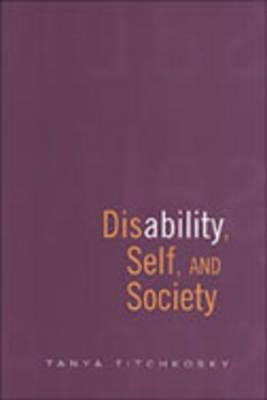
- We will send in 10–14 business days.
- Author: Tanya Titchkosky
- Publisher: University of Toronto Press
- ISBN-10: 0802084370
- ISBN-13: 9780802084378
- Format: 15.3 x 23.3 x 2.2 cm, softcover
- Language: English
- SAVE -10% with code: EXTRA
Reviews
Description
Disability, Self, and Society speaks with authenticity about disability as a process of identity formation within a culture that has done a great deal to de-emphasize the complexity of disability experience. Unlike many who hold the conventional sociological view of disability as a 'lack' or stigmatized identity, Tanya Titchkosky approaches disability as an agentive (not passive) embodiment of liminality and as a demonstration of socially valuable in-between-ness. She argues that disability can and should be a 'teacher' to, and about, non-disabled or 'temporarily abled' society.
Titchkosky's poignant reflections on disability rely on the thought of Hannah Arendt as well as her personal experience as an individual with dyslexia living with a blind partner; she uniquely draws on her own and others' situations in order to demonstrate the sociopolitical character of disability. A thoughtful and cohesive integration of narrative and theory, Disability, Self, and Society presents a critical Canadian contribution to the growing subject of disability studies.
EXTRA 10 % discount with code: EXTRA
The promotion ends in 16d.16:17:21
The discount code is valid when purchasing from 10 €. Discounts do not stack.
- Author: Tanya Titchkosky
- Publisher: University of Toronto Press
- ISBN-10: 0802084370
- ISBN-13: 9780802084378
- Format: 15.3 x 23.3 x 2.2 cm, softcover
- Language: English English
Disability, Self, and Society speaks with authenticity about disability as a process of identity formation within a culture that has done a great deal to de-emphasize the complexity of disability experience. Unlike many who hold the conventional sociological view of disability as a 'lack' or stigmatized identity, Tanya Titchkosky approaches disability as an agentive (not passive) embodiment of liminality and as a demonstration of socially valuable in-between-ness. She argues that disability can and should be a 'teacher' to, and about, non-disabled or 'temporarily abled' society.
Titchkosky's poignant reflections on disability rely on the thought of Hannah Arendt as well as her personal experience as an individual with dyslexia living with a blind partner; she uniquely draws on her own and others' situations in order to demonstrate the sociopolitical character of disability. A thoughtful and cohesive integration of narrative and theory, Disability, Self, and Society presents a critical Canadian contribution to the growing subject of disability studies.


Reviews